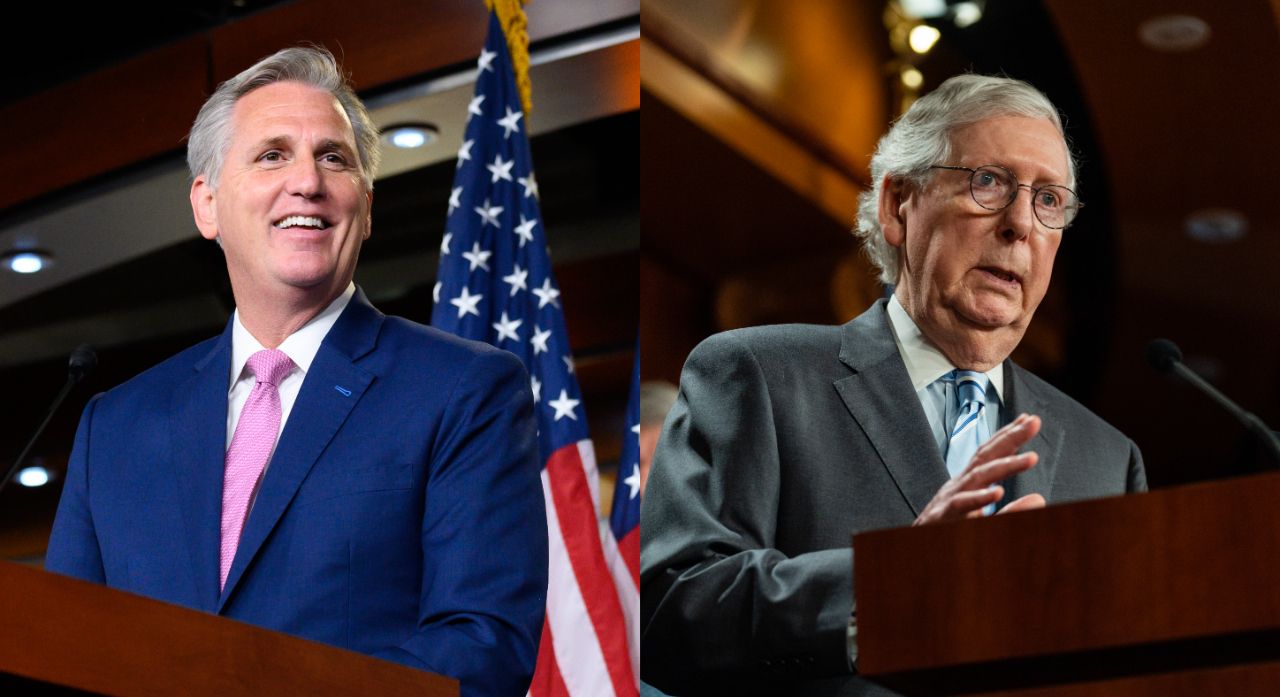House and Senate Republicans' midterm fortunes are rapidly diverging


Even Republicans are beginning to acknowledge that their path back to power in the Senate in this fall's elections is far less clear than in the House.
Why it matters: The sharp divergence between the GOP's fortunes in the two chambers highlights the role candidate recruitment — and the involvement of former President Trump — has played in the 2022 midterm cycle.
Driving the news: Senate Minority Leader Mitch McConnell (R-Ky.) admitted at an event in his home state on Thursday that "there's probably a greater likelihood the House flips than the Senate."
- "Senate races are just different, they're statewide, candidate quality has a lot to do with the outcome," he said.
The big picture: Republicans are facing persistent candidate quality problems and money issues in winnable Senate races.
- Ohio: In a state Trump won by 10 points, the McConnell-affiliated Senate Leadership Fund is suddenly intervening with a massive $28 million ad reservation on behalf of Republican J.D. Vance, who is running neck and neck with Rep. Tim Ryan (D-Ohio).
- Pennsylvania: Republican Mehmet Oz has faced a cascade of negative stories focused on his wealth and New Jersey roots, gleefully boosted by the internet-savvy campaign of his Democratic opponent, Lt. Gov. John Fetterman.
- Wisconsin: Sen. Ron Johnson (R-Wis.) is trying to salvage his unfavorable image in his home state amid a spirited challenge from progressive Lt. Gov. Mandela Barnes.
- Georgia: Republican Herschel Walker's effort to unseat Sen. Raphael Warnock (D-Ga.) has been beset by a cascade of gaffes, previously undisclosed children and scrutiny of his troubled past.
- Arizona: Democrats have seized on extreme positions by Trump-backed nationalist Blake Masters — especially on abortion and Social Security — in hopes of tanking his bid against Sen. Mark Kelly (D-Ariz.).
Yes, but: Republicans still see hope in Georgia and Arizona as well as states like Nevada and New Hampshire, where Democratic incumbents face harsh realities in a year in which inflation and rising gas prices have the fundamentals squarely on the GOP's side.
The other side: House Republicans, meanwhile, are targeting districts President Biden won by double digits in an ambitious effort to pad the majority they're confident they'll win.
- House Minority Leader Kevin McCarthy, for example, has made a concerted effort to boost Allan Fung, Republicans' nominee in Rhode Island's 2nd District, which President Biden won by more than 13 points.
- They're also eyeing districts like New York's 17th, home of Rep. Sean Patrick Maloney (D-N.Y.), chair of the Democratic Congressional Campaign Committee.
What we're hearing: Republican operatives who spoke to Axios credited House Republicans' active involvement in primaries — in contrast with Senate Republicans' policy of neutrality — as the driver of their success.
- The vacuum left by the Senate Republican establishment was filled by former President Trump, who values personal fealty far more than electability.
What they're saying: "Republican outside groups have taken a more active role in open primaries to promote electable candidates and get them through their primaries," said one Republican campaign operative, pointing to the McCarthy-aligned Congressional Leadership Fund spending $7 million in primaries.
- McCarthy and National Republican Congressional Committee Chair Tom Emmer (R-Minn.) "have done an amazing job of recruiting the best class of candidates to have ever run as House Republicans, both in quantity and quality," said one national GOP strategist.
- "That's one of the main reasons we are seeing House Republicans reach deep into traditionally Democrat seats and compete."
The bottom line: FiveThirtyEight's election forecasting model puts Republicans' odds to win the House at 77 in 100 — compared to 36 in 100 for winning the Senate.